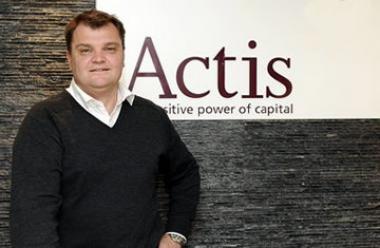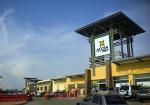Actis pours R2.8bn in Sub-Saharan Africa property developments
 London-based private equity investor Actis, which invests in emerging markets has injected an extra R2.8 billion into property developments in Sub-Saharan Africa region. (Photo: Actis director Louis Deppe)
London-based private equity investor Actis, which invests in emerging markets has injected an extra R2.8 billion into property developments in Sub-Saharan Africa region. (Photo: Actis director Louis Deppe)
London-based private equity investor Actis, which invests in emerging markets has injected an extra R2.8 billion (approx. US $278 million) into property developments in Sub-Saharan Africa region.
The latest capital injection takes the firm’s entire African capital spending in its funds to approximately R4.4 billion (US $433 million)
Louis Deppe, a director at Actis, believes that there is a lot of activity in the “private equity space” particularly in the region.
This has somewhat been prompted by the latest rise of actors like Rand Merchant Bank (RMB), Westport and Stanlib in the private equity space.
It is understood that the sub-Saharan Africa region, with the exception of South Africa, has insufficient investment in high profile estates (properties).
JSE-listed funds have allegedly shown little attraction to injecting money into the continent.
But the advancement of excellent stock by private equity companies is likely to attract bigger attention from the publicly traded sector.
Actis has two real estate development funds and it claims to be the only pan-emerging private equity firm.
With $5 billion managed by 105 investment professionals, the company has put in money in 65 companies, employing 101,000 people.
The private equity firm has invested $4 billion in emerging markets so far. The company has realised $2.2 billion from its investment since the company was started in 2004.
Meanwhile, JSE-listed Resilient Property Income Fund has also taken a developmental role in Africa. Resilient Africa, an initiative with partners Standard Bank and Shoprite, to which Resilient has committed R600m, has begun construction of a mall in Warri, Nigeria, to be anchored by Shoprite.
In Actis’s first fund, which has closed, about $155m of equity was committed, while the firm’s second fund is "the biggest private real estate fund in Africa" at about $278m, Mr Deppe says. These figures exclude debt, and as the funds usually target a debt-to-equity ratio of about 60%-40%, total capital spent is substantially more than the $433m equity commitments.
The funds’ investments have targeted all real estate classes in sub-Saharan Africa, excluding South Africa. Investments have focused on Tanzania, Zambia, Kenya, Uganda, Ghana, Nigeria and Mauritius.
Among the six developments being constructed in the second fund is a major office development in Ghana, and a sizeable mixed-use Garden City project in Nairobi. The $250m Garden City development will house a 50,000m² retail centre, more than 420 apartments and townhouses, commercial offices and a 1,2ha central park.
Other completed projects under the first fund include Ikeja City Mall in Lagos, Accra Mall in Ghana and The Junction in Nairobi.
Mr Deppe says while the first fund had only one large investor, an encouraging sign is that the second fund has a wider investor base.
He says most of the investor interest for African real estate developments funding is coming from Europe, North America, the Middle East and Asia.
Moreover, when selling completed developments, "the depth of the exit market has grown dramatically", with interest too from South African property groups.
Atterbury Africa, jointly controlled by Atterbury Group and JSE-listed Hyprop Investments, has acquired a 47% stake in Accra Mall, which has become a springboard for the consortium for its own investments into Ghana.
Mr Deppe says the growth of the exit market, and with it growing interest from investors in the countries where stock is being developed, is being spurred by the formalisation of real estate investment trust (Reit) markets in Africa. This is "starting to unlock the pent-up demand for assets", which is positive for those who develop and hold stock, he says.
Naledi Mongoato, investment analyst at Novare Equity Partners, says given the growing number of shopping mall developments in Africa, Reit legislation "offers property developers another exit avenue for their investments, rather than the traditional trade sale".
Mr Deppe says besides Shoprite and a handful of other large groups, retailers from South Africa "have only woken up in the past 18 months" to the African expansion opportunity.
Smaller South African retail groups "haven’t moved fast enough to get there — they are behind the curve". This will see many South African retailers with international franchises missing out, given the proliferation of Middle Eastern and European retailers, including the likes of fashion retailer Zara.
Meanwhile, Mr Deppe punts Actis as front-runner in sustainable initiatives in Africa. He says while there are no formal green building councils on the continent outside of South Africa, Actis is "introducing new technology into all of these markets" and is using rating benchmarks from more established countries to "follow the ethos of green buildings as far as we possibly can".
Heath Andersen, associate director at global engineering firm Arup, says projects in developing parts of Africa generally have bigger issues securing a resilient supply of power and water, "hence this is usually a more pressing issue than sustainability".
"As these markets mature, the more sophisticated drivers such as sustainability will become more relevant," Mr Andersen says.
Mr Deppe says while there is space for an African-focused property fund on the JSE, the challenge at the moment is the limited stock available for such a fund to acquire. Ndabe Mkhize, portfolio manager at Stanlib, says "there is certainly a very strong case" for the establishment of an African-focused property fund on the JSE, which could hold high-quality assets such as Ikeja City Mall.
However, the timing of such a fund’s listing would be important, as much of the stock being developed will only be completed within the next one to three years.

















